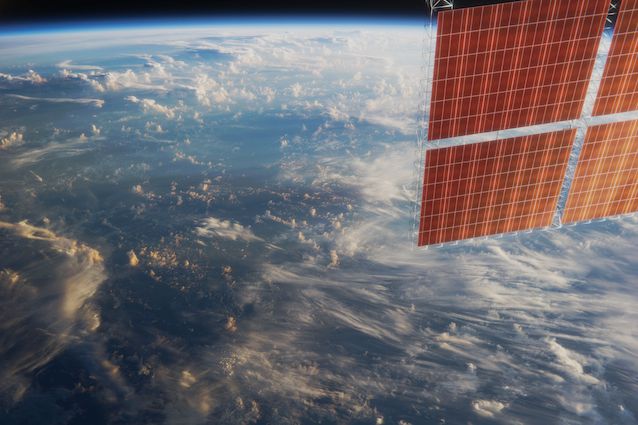Large-scale array to overcome cost and manufacturing limitations of current technology
Tempe, Ariz., November 7, 2023 — Solestial, Inc. (“Solestial”), the solar energy company for space, today announced that it has been awarded $849,954 for a Phase II Small Business Innovation Research (“SBIR”) contract from the National Aeronautics and Space Administration (“NASA”). The winning proposal titled, “Next Generation Silicon Based Solar Arrays for Space Stations and Other Permanent Space Infrastructure,” comes on the heels of a $149,987 Phase I contract in January 2023. The contracts are from a new pilot program, SBIR Ignite, that funds commercially viable technologies from U.S. startups to support research and development and promote economic growth.
The 18-month SBIR Phase II contract will provide funds to support development of next generation, 50-kilowatt (“kW”) class solar array wings. Solestial’s silicon solar blanket technology will allow for arrays larger than any ever built, while also maintaining lower mass and competitive efficiency. The array will be developed in collaboration with Opterus Research & Development (“Opterus”) who will develop a low-cost, novel deployment system for Solestial’s ultrathin, flexible, silicon solar blankets.
“The private space stations and lunar bases of tomorrow will require a tremendous amount of power, and currently, there are no affordable and scalable space solar technologies that can accommodate this demand,” said Stan Herasimenka, Solestial Co-Founder and CEO. “Our affordable and low-mass solar blankets will help to overcome size, cost, and manufacturing limitations to power large-scale spacecraft and surface infrastructure. We’re excited to work with Opterus to make this vision a reality.”

Solestial’s contract-winning proposal focuses on integrating its ultrathin, low mass, radiation-hardened solar blankets with Opterus’ patent pending Retractable-Rollable Mast Array (“R-ROMA”) advanced deployable solar array structure. The R-ROMA is a highly scalable tensioned solar blanket array with double z-folding panels deployed by a single state-of-the-art rollable composite boom. The partnership between Solestial and Opterus will marry the two technologies to overcome the size, cost, and mass limitations of existing solar array technologies. Ultimately, Solestial hopes to achieve 50 kW scale and 200 W/kg array-level specific power while simultaneously reducing costs and scaling manufacturing potential.
Solestial’s Phase I SBIR Ignite contract made it possible to develop the critical technologies required to create a working prototype of the silicon blanket technology. The Phase II award will fund a full-size 50 kW solar array design and space testing of a scaled model.
“We’re excited to be partnering with Solestial on this pioneering technology development project,” said Erik Pranckh, Director of Business Development, at Opterus. “Our high-performance deployment systems pair perfectly with low-mass solar blankets from Solestial. Together, we can develop the powerful, affordable, next-generation solar arrays needed to power development in space.”
The Ignite award marks the ninth such contract received by Solestial. To date, the firm has received nearly $4 million in contracts from NASA, the National Science Foundation, and the U.S. Air Force.
About Solestial
Solestial, Inc. (“Solestial”) is the solar energy company for space. Solestial’s breakthrough technology is a silicon solar cell engineered for space to self-cure radiation damage under sunlight at a normal operating temperature of 80°C. Solestial solar cells are packaged in an ultrathin, flexible, low-mass solar blanket engineered to withstand up to 10 years in LEO. Solestial solar blankets can be produced using automated machines resulting in costs 90% lower than incumbent technologies. Solestial targets 2025 for the launch of a manufacturing facility capable of producing 10 MW/year of solar blankets. From today’s satellite constellations and research projects to tomorrow’s lunar settlements and services in space, Solestial’s innovative technology represents a paradigm shift for space solar; an affordable, durable, scalable solution to power the new space economy. Solestial is a US company manufacturing cells and blankets in Tempe, Arizona. To learn more, visit our website or follow us on social media.
About Opterus
Opterus Research and Development, Inc. (“Opterus”) designs and manufactures advanced structures. Often incorporating elements of origami, morphing, dynamics, folding, shape changing, and high performance carbon fiber composites. The company is innovating critical deployable spacecraft components and subsystems solutions. Our lightweight retractable-deployable composite masts, booms, and hinges push the frontiers of structural design. Our technologies provide the structural backbone for innovative tension-aligned arrays, blanket and panel solar arrays, deployable reflectors, antennas, and in-space assembly and manufacturing architectures. From conception through design, simulation, analysis, fabrication, and testing – we do it all. To learn more, visit our website Opterus R&D (opterusrd.com).
Media Contact
Eileen Korte
ek@solestial.com
